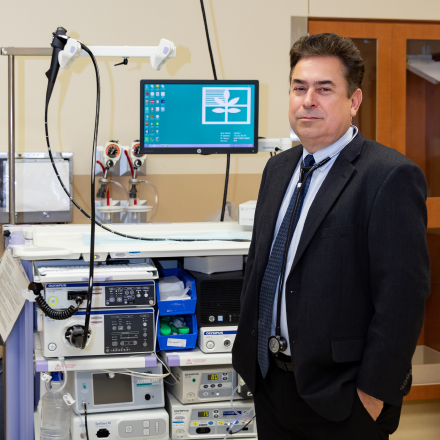Riverside Gastroenterology Specialists – Newport News

Ask Dr. John Boyd about the most rewarding aspects of his specialty and longtime community practice, and you’ll get two very different answers.
One covers the innovative technology and medicines that have allowed him to save and change so many more lives, such as emergency endoscopic interventions for bleeding ulcers. The other is about the impact he can make by taking the time to listen to his patients.
“They’re going through difficult moments, and they need their doctor to be caring, to hold their hand and be someone who sticks by them,” Dr. Boyd says. “I’m often in my office past 8 p.m., calling patients back at home. Many tell me, ‘You’re the first doctor who did this for me.’ I’m not sure why, because to me that’s how medicine should always be.”
Since 1999, Dr. Boyd has practiced with Peninsula Gastroenterology, PC, with hospital affiliation at Riverside Regional Medical Center. As he has built strong local roots, he has embraced a multitude of new treatments that have transformed care.
Other than a cure for hepatitis C, one highlight has been biologic therapies for inflammatory bowel diseases. Delivered intravenously or subcutaneously, the treatments have been revolutionary for patients with ulcerative colitis and Crohn’s disease, who once had few options beyond Prednisone.
“For years, there was so little I could do for them,” Dr. Boyd notes. “These therapies have a low side effect profile, and they have a great benefit in more than 70 percent of patients.”
The continuous evolution of minimally invasive procedures also has been a game-changer. Endoscopic Retrograde Cholangio-Pancreatography (ERCP), for example, allows physicians to diagnose problems in the pancreatic and bile ducts via a flexible tube maneuvered through the mouth. In some cases, they can remove gallstones, tumors or cysts.
Even more advanced endoscopic ultrasound equipment, meanwhile, can deliver needle biopsies of lesions via sound waves. And the Peroral Endoscopic Myotomy (POEM) procedure uses high-definition upper endoscopes to treat achalasia, which impairs swallowing, and certain spastic esophageal disorders, again with access only through the mouth.
“Every few months, there seems to be a major advancement,” Dr. Boyd says. “There is now talk of taking out a gallbladder through the mouth, without a single exterior incision.”
Medicine drew Dr. Boyd in early, for a variety of reasons. He was born in a small town near Manteo, N.C., where his grandparents had a farm. While his military family moved frequently, including a posting to Japan, he was mainly raised in a community of solid, hardworking farmers and fishermen. Every summer, he pitched in on the family farm.
“I can plant a straight row of soybeans or corn, and drive a combine,” he laughs. “Most importantly, I learned the value of working a long and honest day.”
Dr. Boyd enjoyed science and anatomy in school and was fascinated by how different machines work, from the engines and transmissions he picked apart on farm equipment to the far more complex human body. He earned money for medical school by building houses with his father.
Dr. Boyd’s dad was a decorated Vietnam veteran who became Army hospital administrator and often brought his son along to interact with physicians. As a young teenager, Dr. Boyd also developed great respect for a family doctor named Dr. Liverman, who served his entire North Carolina county. A kind and revered figure, Dr. Liverman handled everything from delivering babies to managing diabetes in older patients, including Dr. Boyd’s grandmother.
When Dr. Boyd started medical school at East Carolina University – where he had earned a bachelor’s degree in biology and a master’s in biochemistry, with a thesis on fetal alcohol syndrome – he assumed he would go into family medicine, too. However, he soon decided to narrow his focus and was particularly captivated by both video endoscopy and the complexities of the liver.
“It was remarkable to be able to see inside a stomach on a television,” he recalls. “Then there was the incredible liver, with its thousands of enzymes that create energy for the entire body.”
Diving into internal medicine, Dr. Boyd completed an internship at Richland Memorial Hospital in South Carolina and a residency at Sentara Norfolk General Hospital; he also was a chief resident at DePaul Medical Center. He followed those with a two-year gastroenterology fellowship and a year-long pancreaticobiliary fellowship at Medical College of Virginia.
Dr. Boyd moved to the Peninsula to serve what was then an underserved community in terms of GI specialists. Two decades later, he sometimes finds himself caring for three generations of patients. “For all the diplomas on the wall, nothing is more rewarding than knowing a family trusts me with their health,” he says.
In many cases, in fact, Dr. Boyd becomes more than a gastroenterologist. If an older patient seems depressed and lonely, for instance, he might research volunteer opportunities or contact a pastor at his or her church. “Patients shouldn’t ever feel rushed when I’m with them,” he says. “My philosophy is that’s an important piece to helping them.”
So not surprisingly, during the same conversation in which he touches on the future promise of gene therapies, Dr. Boyd takes delight in discussing his “simple” hobbies: carpentry, home repair, mechanical work and painting.
“I like to see the real, tangible results of my efforts,” he says. “I want to be proud of what I’ve built or accomplished. It’s a joy that I discovered as a child, and it has influenced me throughout my career.”

